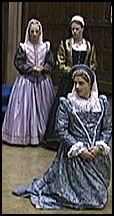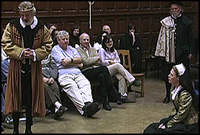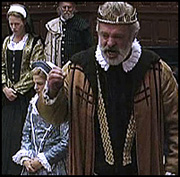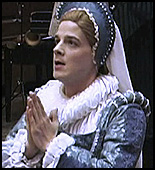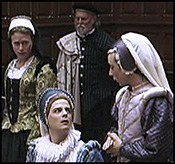- Edition: King Leir
King Leir
- Introduction
- Texts of this edition
- Contextual materials
- Facsimiles
24King Leir, Scene 3
Cast
King Leir: Don Allison
Perillus: Peter Higginson
Skalliger: David Kynaston
Ragan: Derek Genova
Gonorill: Matthew Krist
Cordella: Julian DeZotti
Queen's Men Dramaturgy: Moral Dichotomy (Sc. 3)
25 If we approach Shakespeare's play without any prior knowledge of the story, then we may be uncertain whether Goneril and Regan are falsifying their love at the moment when they first speak. Cordelia does not pass comment until after the elder sisters have spoken, and initially Cordelia's comments are enigmatic, she knows her "loue's/More ponderous then [her] tongue" (![]() F: TLN 83-4). Kent subsequently defends the depth of Cordelia's love and challenges the elder sisters to live up to their words but does not say they are liars (
F: TLN 83-4). Kent subsequently defends the depth of Cordelia's love and challenges the elder sisters to live up to their words but does not say they are liars (![]() F: TLN 153-164). Unlike the Queen's Men play Shakespeare does not confirm they are lying until after they speak; it remains a matter of opinion until the sisters contradict their expressions of love at the end of the scene and reveal their lack of respect for their father. King Leir,in contrast, has taken pains to establish the moral framework for the audience by having Gonorill and Ragan flaunt their wicked intentions in the previous scene.
F: TLN 153-164). Unlike the Queen's Men play Shakespeare does not confirm they are lying until after they speak; it remains a matter of opinion until the sisters contradict their expressions of love at the end of the scene and reveal their lack of respect for their father. King Leir,in contrast, has taken pains to establish the moral framework for the audience by having Gonorill and Ragan flaunt their wicked intentions in the previous scene.
26The two scenes can be distinguished by the degree to which they control the audience's interpretation of the action. The moral purpose of the Queen's Men scene is more clear-cut than Shakespeare's and owes much to the morality tradition that was still central to the theatre scene in the 1580s. Shakespeare's company also performed moral plays, and I am not suggesting any absolute break from tradition here, but the dramaturgy of his version of this scene allows for a greater freedom of interpretation. In contrast, the Queen's Men dramaturgy is comparable to Bertolt Brecht's use of title cards that describe the action of the scenes that follow - the audience is told what is going to happen and can then focus on how it happens. By previously establishing the malicious intentions of Gonorill and Ragan the audience is encouraged to adopt a particular perspective on the morality of the action. The narrative over-determination discussed in relation to the previous scene is dramaturgically central to the Queen's Men's moralizing drama.
Read more about Queen's Men Drmaturgy: Moral Dichotomy
Performing the Love Test (Sc. 3)
27 The different dramaturgy invited a different approach to performance. Maintaining their commitment to the wickedness of the sisters established in scene 2, the actors made it perfectly apparent that they were lying to their father. This performance choice met with resistance from the company since the sisters' lies were also apparent to Don Allison, the actor playing Leir. One of the principal rules of psychological realism is that if your character is lying, lie well, or else you will make your acting partner's character appear stupid and therefore undermine him or her in the eyes of the audience - blatant lying is the territory of comedy not psychological realism or tragedy. Part of our struggle with this scene involved separating the Queen's Men's play from Shakespeare's and all the cultural expectations that arise from that association. The Queen's Men Leir is not a tragedy; it is a moral romance and the dramaturgy encourages a playful approach to all aspects of the story. In this scene, emphasizing the daughters' deception pushed the scene towards comedy, exposing the folly of the protagonist, an effect that was very much in keeping with the play's morality.
28Each sister takes a moment to indirectly attack Cordella, the real target of their deception. Gonorill refers to Cordella's refusal to obey Leir in her choice of husband:
Nay, more, should you appoint me for to marry
The meanest vassal in the spacious world,
Without reply I would accomplish it. (TLN 248-250)
29Ragan also refers to her obedience in marriage and more openly challenges Cordella, saying:
Oh, that there were some other maid that durst
But make a challenge of her love with me (TLN 261-262)
30Matthew Krist (Gonorill) gave many of his lines in this scene a mock insouciance and Derek Genova (Ragan) inclined his head towards Cordella marking her as implied object of the challenge. These performance choices emphasized the difference between the intentions of their words as perceived by Leir and the actual intention understood by the audience. Our awareness of the discrepancy was pleasurable and encouraged us to enjoy the sisters' wickedness, while at the same time reminding us of the king's folly.
31 Developing the appropriate style for this scene and the play as a whole was a delicate balancing act: over-emphasizing the comedy would have undermined the emotional import of the scene, which, for all the characters, is extremely high. With rehearsal, the company found the requisite balance and became comfortable with the mixture of comic elements and high emotion that is characteristic of the Queen's Men dramaturgy. Don Allison (Leir), for example, began to add a touch of childlike naivety to his responses to the flattery (TLN 253 and TLN 273), which illuminated his moral folly by highlighting his inability to recognize his daughter's lies. The company became adept at shifting the tone of the scenes from the comic to the serious. The audience laughed at the sisters obvious lies but the laughter stopped when Allison (Leir) became consumed with fury at the line "Peace, bastard imp" (TLN 312).
Watch video of Scene 3 on the Performing the Queen's Men website. (The video footage is password protected. Click on "Cancel" in the pop-up window to obtain password.)
Queen's Men Dramaturgy: Sudden Emotion and the Medley Style (Sc. 3)
32Shakespeare teases out Lear's transition from confusion to fury with a 21 line exchange between father and Cordelia (![]() F: 93-114), but King Leir's rage is more sudden: he responds to Cordella with "What minion?" and, prompted by Gonorill and Ragan's pretended shock, he launches into a tirade against disrespectful children. The SQM company found that the plays were full of such sudden shifts of extreme emotion. In fact, each of the plays contains an important conversion scene that is constructed to make a feature of this performance technique. For actors used to psychological realism and its gradually shifting emotional states, this device was alien. Half-hearted commitment falsified these moments and the actors found that they simply had to jump into the new emotional state without reservation. The fact that the audience may have been laughing immediately before, or that their character was previously in an entirely different state, was no excuse for not committing to the sudden shift in emotion. In this instance, by the time Leir interrupts Cordella with "Peace, bastard imp" (TLN 312) - the kind of shocking epithet that Shakespeare reserved for later in his play - Don Allison (Leir) was fully committed to an overpowering and irrational fury.
F: 93-114), but King Leir's rage is more sudden: he responds to Cordella with "What minion?" and, prompted by Gonorill and Ragan's pretended shock, he launches into a tirade against disrespectful children. The SQM company found that the plays were full of such sudden shifts of extreme emotion. In fact, each of the plays contains an important conversion scene that is constructed to make a feature of this performance technique. For actors used to psychological realism and its gradually shifting emotional states, this device was alien. Half-hearted commitment falsified these moments and the actors found that they simply had to jump into the new emotional state without reservation. The fact that the audience may have been laughing immediately before, or that their character was previously in an entirely different state, was no excuse for not committing to the sudden shift in emotion. In this instance, by the time Leir interrupts Cordella with "Peace, bastard imp" (TLN 312) - the kind of shocking epithet that Shakespeare reserved for later in his play - Don Allison (Leir) was fully committed to an overpowering and irrational fury.
Watch video of Scene 3 on the Performing the Queen's Men website. (The video footage is password protected. Click on "Cancel" in the pop-up window to obtain password.)
Read more about Queen's Men medley style
Performing Cordella (Sc. 3)
33 The audience meets Cordella in person for the first time in this scene. They have heard of her resistance to her father's marriage plans, that Perillus esteems her, and that her sister's despise her for pride and arrogance, but they have yet to form their own opinion. In the SQM production, Cordella was dressed in a relatively modest satin blue dress that distinguished her from her more garishly costumed sisters. On entering she took up a position stage left, on the margins of the scene but with easy access to the audience beside her. Since the audience knows Gonorill is lying, they also know that Cordella speaks the truth when she identifies her sister's words as flattery. From his position at the side of the stage, Julian DeZotti (Cordella) was able to develop an intimate relationship with the audience.
34 I encouraged DeZotti (Cordella) to conceive of his character as a representation of feminine virtues, the moral and theatrical counterpoint to her Vice-like sisters. Julian found this direction extremely limiting and over the course of the run developed a better rounded character that in retrospect I believe was a truer reflection of the character as represented in the text. In this scene, Julian played Cordella with a quiet, modest humility, but as elsewhere, the text implied a strength of mind and assertiveness beyond the limitations of conservative patriarchal ideals. Here, Cordella resists her sisters' arguments accusing them of manufacturing their own false tributes: "The praise were great, spoke from another's mouth,/But it should seem your neighbors dwell far off" (TLN 306-7). As Julian became more comfortable with his role and developed his characters for the other plays, Cordella became increasingly assertive and admirable in her desire for self-definition.
35Read more about performing Cordella in the SQM production.
Read more about Julian's performances in the SQM productions and watch video interviews with the actor on the Performing the Queen's Men website.
Watch video of Scene 3 on the Performing the Queen's Men website. (The video footage is password protected. Click on "Cancel" in the pop-up window to obtain password.)

